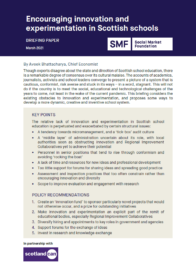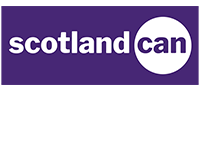Though experts disagree about the state and direction of Scottish school education, there is a remarkable degree of consensus over its cultural malaise. This briefing considers the existing obstacles to innovation and experimentation, and proposes some ways to develop a more dynamic, creative and inventive school system.
Key points
If Scotland is to meet the social, educational and technological challenges of the years to come, not least in the wake of the current pandemic, its school system will need to overcome a cautious, conformist and risk averse culture. The relative lack of innovation and experimentation in Scottish school education is perpetuated and exacerbated by certain structural issues:
- A tendency towards micromanagement, and a ‘tick-box’ audit culture
- A ‘middle layer’ of administration uncertain about its role, with local authorities seen as obstructing innovation and Regional Improvement Collaboratives yet to achieve their potential
- Personnel in senior positions that tend to rise through conformism and avoiding ‘rocking the boat’
- A lack of time and resources for new ideas and professional development
- Too little support for forums for sharing ideas and spreading good practice
- Assessment and inspection practices that too often constrain rather than encouraging innovation and diversity
- Scope to improve evaluation and engagement with research
Policy recommendations
- Create an ‘innovation fund’ to sponsor particularly novel projects that would not otherwise occur, and a prize for outstanding initiatives
- Make innovation and experimentation an explicit part of the remit of educational bodies, especially Regional Improvement Collaboratives
- Diversify hiring and appointments to key roles in government and agencies
- Support forums for the exchange of ideas
- Invest in research and knowledge exchange

Download The Report: PDF
In partnership with

